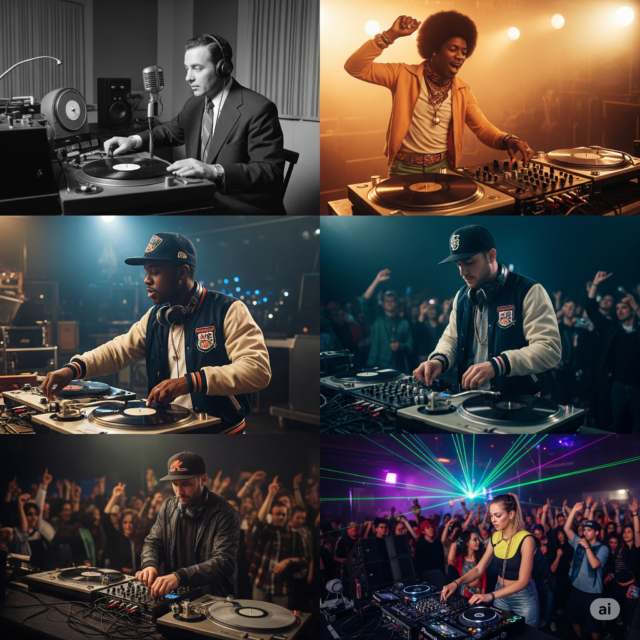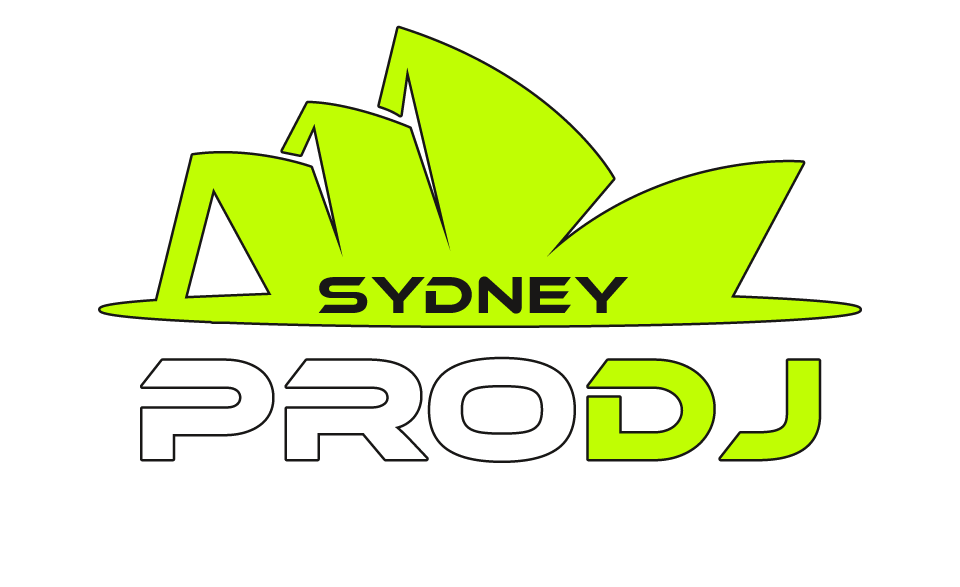
Over the past few decades, the world of DJing has transformed dramatically. What started with spinning vinyl records in underground clubs has evolved into complex digital performances powered by cutting-edge technology. Today’s DJs are more than just music mixers — they are entertainers, producers, and digital artists.
🎵 The Birth of DJ Culture
DJ culture began in the 1970s with pioneers like Kool Herc and Grandmaster Flash who used turntables to loop beats and create new sounds. These early DJs were the backbone of hip-hop and electronic music, using vinyl records and analog mixers to build their sets.
Key tools of the time:
- Turntables
- Analog mixers
- Vinyl crates
💽 The Shift to CDs and MP3s
In the late 1990s and early 2000s, the industry shifted towards CDJs and digital music files. This allowed DJs to carry thousands of tracks on a USB drive instead of lugging heavy crates of records.
Advantages:
- Easier setup
- Faster music access
- Less physical storage needed
💻 The Rise of Digital DJing
Today, many DJs use software-based platforms like Serato, Traktor, or Rekordbox. These tools allow seamless integration with controllers, laptops, and streaming services.
Modern DJ setups include:
- DJ controllers
- Laptops with DJ software
- Performance pads and effects
From vinyl to virtual, DJing has evolved into an art form that bridges tradition with technology — and it’s only getting more exciting.

61 comments
b9gameapk
January 2, 2026 at 6:07 pm
Got the b9gameapk on my phone. Works great! Downloading was simple. Good for gaming on the go man, yeah b9gameapk.
unlocker
January 10, 2026 at 4:14 am
unlocker.ai – The Ultimate AI Tool for Bypassing Restrictions and Unlocking Content Seamlessly!
okebet168
January 11, 2026 at 2:47 am
https://www.okebet168u.org I am thanksful for this post!
phtaya01
January 11, 2026 at 12:35 pm
https://www.phtaya01.org I am thanksful for this post!
pagcor
January 13, 2026 at 2:11 am
https://www.ngpagcor.net I am thanksful for this post!
mwplay88fun
January 13, 2026 at 4:10 pm
mwplay88fun https://www.mwplay88fun.org
tayabet
January 13, 2026 at 4:42 pm
tayabet https://www.yetayabet.net
91phcom
January 14, 2026 at 8:21 am
91phcom https://www.91phcom.net
taya777login
January 14, 2026 at 8:33 am
taya777login https://www.wtaya777login.com
77jili
January 14, 2026 at 8:36 am
77jili https://www.77jilig.net
taya333
January 14, 2026 at 8:49 am
taya333 https://www.taya333.org
9apisologin
January 14, 2026 at 9:15 am
9apisologin https://www.it9apisologin.com
pin77 online
January 14, 2026 at 9:32 am
pin77 online https://www.pin77-online.com
phtaya01
January 14, 2026 at 9:44 am
phtaya01 https://www.phtaya01.org
pagcor
January 14, 2026 at 10:02 am
pagcor https://www.ngpagcor.net
phtaya11
January 14, 2026 at 10:06 am
phtaya11 https://www.phtaya11y.com
playpal77
January 14, 2026 at 10:10 am
playpal77 https://www.playpal77sy.org
pin77 app
January 14, 2026 at 10:14 am
pin77 app https://www.pin77.tech
2222ph
January 14, 2026 at 10:14 am
2222ph https://www.be2222ph.org
fg777link
January 14, 2026 at 10:23 am
fg777link https://www.befg777link.com
jl16login
January 14, 2026 at 10:24 am
jl16login https://www.adjl16login.net
jilibet004
January 14, 2026 at 10:26 am
jilibet004 https://www.jilibet004.org
pesomaxfun
January 14, 2026 at 10:32 am
pesomaxfun https://www.elpesomaxfun.com
phtaya10
January 14, 2026 at 10:38 am
phtaya10 https://www.phtaya10y.com
fb777 slot
January 14, 2026 at 10:46 am
fb777 slot https://www.fb7777-slot.com
jiliokcc
January 14, 2026 at 10:51 am
jiliokcc https://www.jiliokccw.com
okebet3
January 14, 2026 at 10:55 am
okebet3 https://www.okebet3u.org
jililuck 22
January 14, 2026 at 10:58 am
jililuck 22 https://www.jililuck-22.com
tg77com
January 14, 2026 at 11:01 am
tg77com https://www.tg77com.org
777phl casino
January 14, 2026 at 11:05 am
777phl casino https://www.777phl.org
peso99
January 14, 2026 at 11:09 am
peso99 https://www.repeso99.net
ph22login
January 14, 2026 at 11:17 am
ph22login https://www.ph22login.org
99boncasino
January 14, 2026 at 11:19 am
99boncasino https://www.99boncasino.net
fb777login
January 14, 2026 at 11:21 am
fb777login https://www.fb777loginv.org
slotphlogin
January 14, 2026 at 11:22 am
slotphlogin https://www.exslotphlogin.net
phtaya 63
January 14, 2026 at 11:26 am
phtaya 63 https://www.phtaya-63.org
a45com
January 14, 2026 at 11:28 am
a45com https://www.a45com.org
nustar online
January 14, 2026 at 11:29 am
nustar online https://www.etnustar-online.com
phtaya06
January 14, 2026 at 11:35 am
phtaya06 https://www.phtaya06y.com
tongits go
January 14, 2026 at 11:36 am
tongits go https://www.yatongits-go.net
2jili
January 14, 2026 at 11:36 am
2jili https://www.2jili.org
balato88
January 14, 2026 at 11:37 am
balato88 https://www.balato88u.com
gg789loginbet
January 18, 2026 at 4:29 am
Alright, gotta say I’ve been messing around on gg789loginbet. The login process is simple enough, thank god! Site’s easy to navigate on my phone which is crucial. I’m mainly into the mention specific interest e.g., live casino games, and they’ve got a good spread. I’d recommend giving it a look-see. More deposit options would be great, though! gg789loginbet
citibet88bet
January 18, 2026 at 4:30 am
Citibet88bet, huh? Sounds kinda catchy. I’m always on the lookout for a new place to play. Anyone got any firsthand experience with ’em? Let me know if it’s worth a punt! Find it here: citibet88bet
999exchangebet
January 18, 2026 at 4:30 am
999exchangebet! That number sequence makes me think I’m about to win big. Has anyone used their exchange? Is it smooth and reliable? Important things, right? Check it out for yourself: 999exchangebet
1eecom
January 19, 2026 at 1:42 am
Yo, 1eecom looks like a pretty streamlined platform. I’m browsing it right now and its pretty straightforward. See for yourself! 1eecom.
phdreamvip1
January 19, 2026 at 1:42 am
Just tried phdreamvip1, and it’s actually pretty cool. The interface is smooth, and I won a little bit. Worth checking out if you’re looking for something different phdreamvip1.
66zzgames
January 19, 2026 at 1:42 am
Just having a look at the slots on 66zzgames, it is easy to navigate which is a good change in this day and age! Take a look at it! 66zzgames
winehq
January 19, 2026 at 8:33 pm
winehq https://www.labwinehq.com
ph333
January 19, 2026 at 8:54 pm
ph333 https://www.laph333.org
j9bet
January 23, 2026 at 3:57 am
J9bet – Has anyone had a positive experience cashing out? I’ve read a few conflicting reports. I’d love to try it, but super nervous about slow withdrawals. j9bet
ko66bisap
January 23, 2026 at 3:57 am
Just discovered ko66bisap! Looks like it’s been around for a while. Is it worth signing up? Love to know your thoughts! ko66bisap
kubetvina
January 23, 2026 at 3:58 am
Heard Kubetvina is popular with some of my friends. I think I will give this casino a try and hope there are some surprising games. kubetvina
jljl3355
January 24, 2026 at 7:41 pm
jljl3355 https://www.jljl3355w.net
w777
January 24, 2026 at 7:53 pm
w777 https://www.law777.net
phwin25
January 24, 2026 at 7:57 pm
phwin25 https://www.phwin25g.net
panalo99
January 24, 2026 at 8:08 pm
panalo99 https://www.uspanalo99.net
xojili
January 25, 2026 at 5:23 am
xojili https://www.lixojili.net
ta777
January 26, 2026 at 10:15 am
ta777 Official Site: Best Online Slot Casino in the Philippines. Easy ta777 Login, Fast Register, and Secure App Download. Experience the ta777 official site, the top online slot casino in the Philippines. Enjoy easy ta777 login, fast ta777 register, and secure ta777 app download. Play premium ta777 slot games and start winning big today! visit: ta777
kkkkph
January 26, 2026 at 1:11 pm
Kkkkph Casino Philippines: Top Slots & Online Gaming. Quick Kkkkph Login, Register Today, and Get the Kkkkph App Download for the Best Casino Experience. Experience Kkkkph Casino Philippines! Fast kkkkph login & kkkkph register to play top kkkkph slots. Get the kkkkph app download for the best mobile casino gaming today! visit: kkkkph
jljl88
January 26, 2026 at 4:14 pm
jljl88 slots|jljl88 casino|jljl88 giris|jljl88 register|jljl88 login Experience the ultimate gaming at jljl88 casino, the Philippines’ top destination for online players. Explore a massive variety of jljl88 slots, enjoy a seamless jljl88 login, and fast jljl88 register access. Join jljl88 giris today for exclusive bonuses and big wins! visit: jljl88